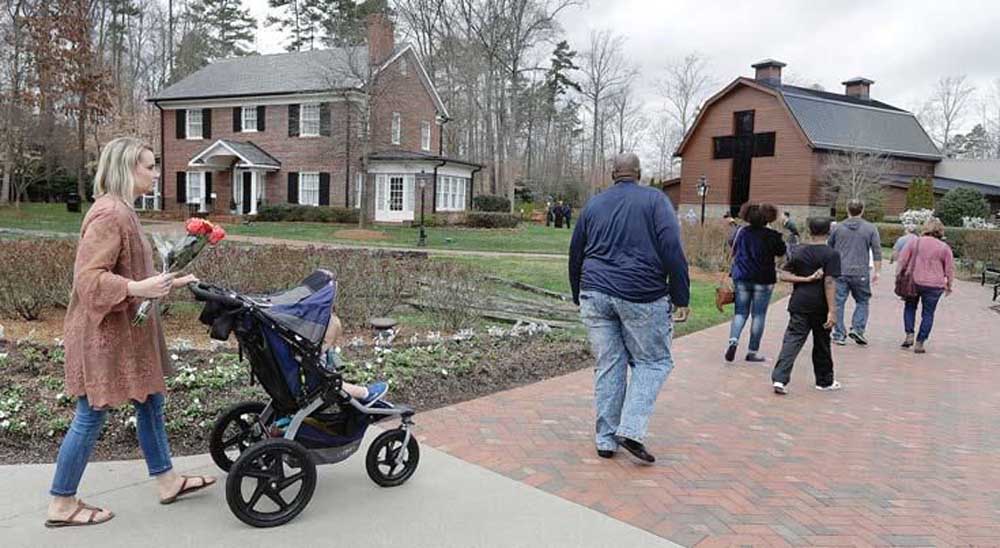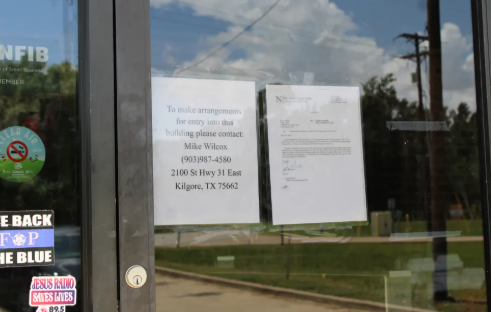Minister’s reach was worldwide, included US presidents
Published 3:35 am Thursday, February 22, 2018

- REBEKAH RICHARDSON and others visit the Billy Graham Library in Charlotte, N.C., Wednesday after the longtime evangelist's death. Said North Carolina Gov. Roy Cooper: "Billy Graham was a strong, humble, positive and passionate North Carolina man of faith who made a difference in the lives of so many. Rest with God, Reverend Graham."
When a young religious crusader named Billy Graham began preaching to the masses after World War II, he wore bright gabardine suits with loud, wide ties and argyle socks to show that Christianity wasn’t dreary
And he did not hide behind a pulpit. He “stalked and sometimes almost ran from one end of the platform to the other,” one biographer noted, while beseeching unbelievers to give themselves to the higher power he praised with unassailable conviction.
Trending
That style drew 350,000 people to a tent in downtown Los Angeles over eight weeks in 1949 — the first major Billy Graham crusade. When it closed 65 sermons later, the mesmerizing preacher was known across the country — and, before long, around the world.
Graham, the most dominant American pastor of the second half of the 20th century, who lifted evangelism into the religious mainstream and through the power of his voice and personality unit-united the often fractious worldwide evangelical community, died at his home Wednesday morning in North Carolina. He was 99.
A Southern Baptist minister known for his simple faith and folksy charm, Graham had been in failing health over the last decade with Parkinson’s disease, prostate cancer and macular degeneration. He had been hospitalized numerous times with respiratory problems.
“No one was more important in legitimizing evangelism,” said William Martin, one of Graham’s biographers. “It’s now on equal footing to mainline Protestantism and Catholicism in the U.S.”
Graham’s reach was staggering. He preached to nearly 215 million people in more than 185 countries and territories, according to figures compiled by the Billy Graham Evangelistic Association, and was heard and seen by hundreds of millions more through television and radio, newspaper columns and the internet. Graham wrote more than two dozen books, including a 1997 best-selling autobiography, “Just As I Am.” He counseled nearly every American president since Harry Truman, most recently meeting and praying with Barack Obama.
Before the Cold War ended, he talked his way behind the Iron Curtain to preach to millions throughout the communist world.
Trending
“From an almost hardscrabble early life in North Carolina, the precincts of small Bible colleges and Los Angeles tent revivals, he has come to be, with the pope, one of the two best-known figures in the Christian world,” said Martin E. Marty, a Lutheran pastor and divinity scholar.
More than 70 million copies of his sermons have been distributed worldwide. At the height of his career, he received an average of 10,000 letters a day and 8,500 written requests for speaking engagements a year. Most important to Graham, his staff estimated that during his public appearances about 3 million people responded to his call to “accept Jesus Christ as your personal savior.”
A registered Democrat who often seemed more comfortable in the moderate Republican camp, Graham knew
12 presidents and, in his prime, was a fixture at the White House. He spent the last weekend of the Lyndon Johnson presidency there and was the first overnight guest of Richard Nixon after he was sworn into office.
Graham attended or participated in eight presidential inaugurations, but he was also present at the White House during darker days of controversy and scandal.
Graham’s relationships with those in the Oval Office often helped him spread his message around the world in places such as South Africa, where he held integrated rallies, in the Soviet Union and in isolated North Korea, as Nancy Gibbs and Michael Duffy noted in their 2007 book, “The Preacher and the Presidents: Billy Graham in the White House.”
“If I had not been a friend of the presidents,” Graham told Gibbs and Duffy, “in most of those places, they wouldn’t have invited me to see them. The reason (Boris) Yeltsin invited me (to Russia in 1992) was because he knew I knew the president.”
The man, Ms audiences and Ms methods evolved since the early days of evangelical crusades, when tents, sawdust and financial “love offerings” were the trademarks.
His early preaching style was so physically charged — biographer Martin described it as “assault” — that the unconverted could not avoid paying attention. “He never faltered, never groped for a word, never showed the slightest doubt that what he said was absolutely true,” Martin said.
In later years, Graham toned down his wardrobe and refined Ms preaching. But the message remained much the same: that because people are innately sinful, they have been separated from God. Yet because Christ died for mankinds sins, they can be forgiven and united with God if they repent and receive Christ as their savior.
Graham was “a heater-up of cooled-off Christians, a morale-builder to the already converted,” historian Marty said.
Graham began his rise with the 1949 tent revival in Los Angeles, which he called “a city of wickedness and sin.” Over two months, about 350,000 people sat on folding Chan’s in the “Canvas Cathedral” set up nightly at Washington Boulevard and Hill Street. Southern California would later become the scene for four more record-shattering crusades.
Marshall Frady, in his book “Billy Graham: A Parable of American Righteousness,” described Graham as a man of “absolute, indestructible innocence.”
That innocence would prove problematic, particularly in his relationship with Nixon.
Graham, who became friends with Vice President Nixon during the Eisenhower presidency, crossed the line separating politics and religion in 1960, when he wrote an article for Life magazine endorsing Nixon over John F. Kennedy in their race for president. But Henry Luce, chief executive of Time-Life, had second thoughts about running the piece, and it was pulled at the last minute, much to Graham’s relief.
After Nixon’s election in 1968, Graham grew closer to his longtime friend, which would bring him considerable embarrassment in 2002, when tapes of a White House meeting from 1972 were released.
On the tapes, Graham was heard agreeing with Nixon that the American media were dominated by leftwing Jews. And then Graham, in his familiar North Carolina twang, went further:
“Not all the Jews, but a lot of the Jews, are great friends of mine; they swarm around me and are friendly to me because they know that I’m friendly with Israel. But they don’t know how I really feel about what they are doing to this country.”
The remarks shocked Graham supporters and Jewish leaders because the preacher was seen as a staunch ally of the Jewish people. In addition to his unflagging support of Israel, Graham also protested the treatment of Soviet Jews and chastised his fellow Southern Baptists for singling out Jews for conversion.
When the tapes surfaced, Graham initially issued a short apology, saying that he didn’t remember making the comments. When the controversy continued, Graham issued another statement: “I don’t ever recall having those feelings about any group, especially the Jews, and I certainly do not have them now. My remarks did not reflect my love for the Jewish people. I humbly ask the Jewish community to reflect on my actions on behalf of Jews over the years that contradict my words in the Oval Office that day.”
Late in life, Graham reflected on his involvement in politics during a January 2011 email interview with Christianity Today magazine. Asked what he would do differently if he could, Graham replied: “I would have steered clear of politics. … People in power have spiritual and personal needs like everyone else, and often they have no one to talk to. But looking back, I know I sometimes crossed the line, and I wouldn’t do that now.”
Ironically, given the later controversy over his 1972 statements, Graham’s friendship with Jews as well as Catholics and liberal Protestants alienated many right-wing fundamentalists in the 1950s and ’60s. In the 1980s, he distanced himself from the conservative right by speaking out in favor of nuclear disarmament.
Graham’s drift toward liberalism occasionally put a dent in his popularity among his more conservative supporters. One of his biggest public relations challenges came after a preaching trip to the Soviet Union in 1982. Graham returned home to defend himself against accusations that he had gone soft on communism when he said he saw no religious persecution during his six-day trip.
He insisted he was not “duped” and said that behind the scenes, he spoke out forcefully, though “with a smile on my face,” against religious repression and human rights violations in the Soviet Union.
Through all his travels, Graham insisted that the Bible was his simple credo of faith.
Ordained in 1939, Graham was never seriously threatened by the ethical and moral troubles that plagued many high-profile evangelists. He set up a system of checks and balances, including an independent board of directors for the Billy Graham Evangelistic Association, to establish his salary and housing allowance, which was believed to have been well under $150,000. He also never spent time alone — even for lunch or a ride to the airport — with a woman other than his wife.
Frugality and humility were byproducts of Graham’s childhood, spent on his family’s dairy farm near Charlotte, N.C.
One of four children born to Morrow Coffey and William Franklin Graham, Billy Frank, as he was known to his family, was born Nov. 7, 1918, and grew up milking Holsteins and working in the fields.
Reactions to the Rev. Billy Graham’s death
PRESIDENT DONALD TRUMP
In a tweet: “The GREAT Billy Graham is dead. There was nobody like him! He will be missed by Christians and all religions. A very special man.”
FORMER PRESIDENT BARACK OBAMA
“Billy Graham was a humble servant who prayed for so many — and who, with wisdom and grace, gave hope and guidance to generations of Americans.”
FORMER PRESIDENT GEORGE W. BUSH
“Billy Graham was a consequential leader. He had a powerful, captivating presence and a keen mind. He was full of kindness and grace. His love for Christ and his gentle soul helped open hearts to the Word, including mine. Laura and I are thankful for the life of Billy Graham, and we send our heartfelt condolences to the Graham family.”






